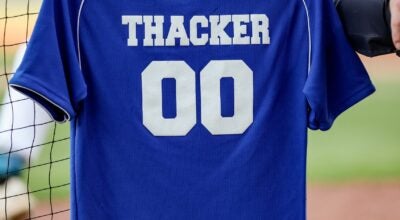NASCAR still waiting on Danica or Ashley
Published 12:00 am Friday, May 23, 2008
By Jenna Fryer
Associated Press
CHARLOTTE ó It was a matchup NASCAR could only dream of: Melanie Troxel and Ashley Force going head-to-head in the first all-female Funny Car elimination round.
Troxel won the round, made it to the finals and ultimately claimed the title Sunday at Thunder Valley Nationals ó making her the first woman in NHRA history to win in both its nitro classes. Troxel downplayed the significance of her matchup with Force, trying hard to remove gender from the historic moment.
“Everybody wants to make a big story about Ashley and I running against each other,” she said. “For me, it’s not about the other female out here. I think it’s pretty sad if we have to just compare ourselves against each other.”
She’s right, of course. Female competitors are no longer a sideshow in most forms of racing, and Troxel’s championship proved women are succeeding at a consistent pace.
Except in NASCAR, that is.
As the most celebrated day in motorsports approaches this week, the differences in gender equality have never been more profound. Danica Patrick headlines a trio of three women who will compete Sunday in the Indianapolis 500, but NASCAR won’t have a single woman in its showcase Coca-Cola 600 later that day or in any of the NASCAR-sanctioned events spanning 10 days of racing at Lowe’s Motor Speedway.
Three decades after Janet Guthrie became the first woman to race in the 600, NASCAR still boasts all-male fields at its premier Sprint Cup level. In fact, no woman has raced in the 600 since Guthrie, and the Cup series has not had a female racer since Shawna Robinson ran seven events in 2002.
“I don’t think it’s something NASCAR is really concerned about. A female driver is not something they really need,” said veteran racer Mike Wallace. “For a while, a lot of people thought it was a novelty. And I’ve had people close to me say ‘Girls can’t drive.’
“Well, maybe they can’t. But maybe there are one or two who can, and we just need to give them a chance.”
Wallace speaks not as a driver with 605 career starts spanning NASCAR’s top three series, but as the father of a 20-year-old female racer who dreams of someday making it to the Cup Series. Although she has just one career start in the Truck Series, Chrissy Wallace has taken over the role as NASCAR’s best bet to make it to the big time.
She’s doing it on her own, piecing together a schedule of seven planned truck races this year for Germain Racing. She was a respectable 18th in her debut at tricky Martinsville Speedway and hopes improvement over her next several races will lead to the funding she needs to run a full schedule next season.
“You have to have decent finishes and win races to attract a sponsor,” Chrissy Wallace said. “If we don’t get one, we’re probably only going to be able to do a limited schedule next season. It’s all based on performance.”
It’s all part of the vicious cycle in racing, where success is as much dependent on financing as talent.
“The issue we have to confront is one of preparation,” said Marcus Jadotte, who oversees NASCAR’s diversity issues. “We need to get more young women involved at a young age.”





